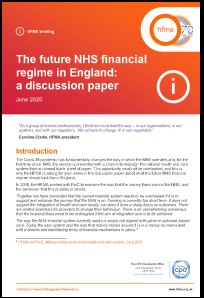Learn Covid lessons for new financial regime, says HFMA
In a report published this week – The future NHS financial regime in England – the association said the pandemic had provided an opportunity to redesign the health and care system from an almost blank sheet of paper. With the report informed by a survey of more than 60 NHS finance directors, the association is now seeking the views of the wider finance function to help shape more detailed proposals.
A majority of finance directors want to see pre-Covid contracting arrangements replaced with block or aligned incentive contracts, according to the HFMA survey.
The NHS was already moving away from tariff-based payment contracts, which have been in wide use with some adaptations across acute providers for around 15 years. However, to support the service’s response to the Covid-19 pandemic, a simplified finance regime has been adopted based on block contracting and top-up payments to cover providers’ exceptional virus-related costs.
The association acknowledges that the unconstrained financial support cannot be maintained for the long-term. However, it believes the current block contract and top-up arrangements should stay in place for the rest of 2020/21 with a move to aligned incentive contracts beyond that. Under aligned incentive contracts, commissioners and providers agree objectives and a block value and may agree risk and gain share mechanisms to deal with changes in demand, activity or costs.
There are different versions of such contracts already in place across England, with different approaches to managing risk (see case study from Leeds Teaching Hospitals NHS Trust and the HFMA’s recent briefing An introduction to aligned incentive contracts). And the association believes the recently introduced blended payments mechanism may be compatible with an aligned incentive approach.
‘There is limited appetite for a cost per case contract model from any sector within the NHS,’ said HFMA director of policy and research Emma Knowles. ‘However, contract arrangements, which support system working, need to be underpinned by robust cost information and we must retain the richness of activity data that a case-based system has encouraged.’
She added that the finance function would have a major role in sense checking any proposed approach, ensuring it avoided the bureaucracy of the pre-Covid regime, while delivering local and national objectives. And any new contract mechanism would need adequate funding.
The HFMA is also calling for the move towards integrated care systems to be accelerated and for commissioners’ role to be more strategic and less about managing transactions. This would allow commissioners to concentrate on managing population health and working with partners to understand and address the wider determinants of health.
The details of such a change – and how this leaves the current purchaser-provider split – need to be developed and the association has invited finance staff to give their views. However it is clear that the increased partnership working during Covid-19 – while facilitated by a national commitment to ensure funding was not a block to tackling the pandemic – has underlined the importance of a more collaborative approach to the commissioning and provision of healthcare.
One finance director from an acute provider said that the NHS needed to ‘build on the trust and mutual support it has developed across systems’. And a mental health trust director said that even where there had been good system working to start with, it had improved during the pandemic, with better engagement with local authorities on social care being a good example.
The HFMA said that the health and social care system needed to be treated as a whole, even though they are legally separate. ‘However equal partnerships need to be supported by resources that enable both parties to contribute,’ the report said. ‘The continued underfunding of social care means that true system working cannot be achieved for the benefit of those who rely on the health and care system.’
The association said that governance appeared to have remained robust during the pandemic, although many processes had been streamlined to enable fast decision making. Serious consideration now needed to be given to whether previous processes should be reinstated or not. And it called for capital allocations to be published for multiple years and to recognise that project costs will increase with inflation between a trust being allocated funding support and building being completed.
The report also highlighted the way finance teams had worked hard and flexibly to meet demands such as preparing financial accounts, while working remotely. They had also kept cash moving quickly through the system ensuring suppliers are paid promptly. Many finance practitioners have also been redeployed to support other urgent priorities such as the procurement and supply of personal protective equipment.
The HFMA said that remote working had been shown to be possible with technology supporting virtual meetings. Processes have been streamlined in some places and there was now an opportunity to catalogue examples of good working practice.
Respond to the questions posed in the HFMA discussion paper by using this survey
Related content
We are excited to bring you a fun packed Eastern Branch Conference in 2025 over three days.
This event is for those that will benefit from an overview of costing in the NHS or those new to costing and will cover why we cost and the processes.